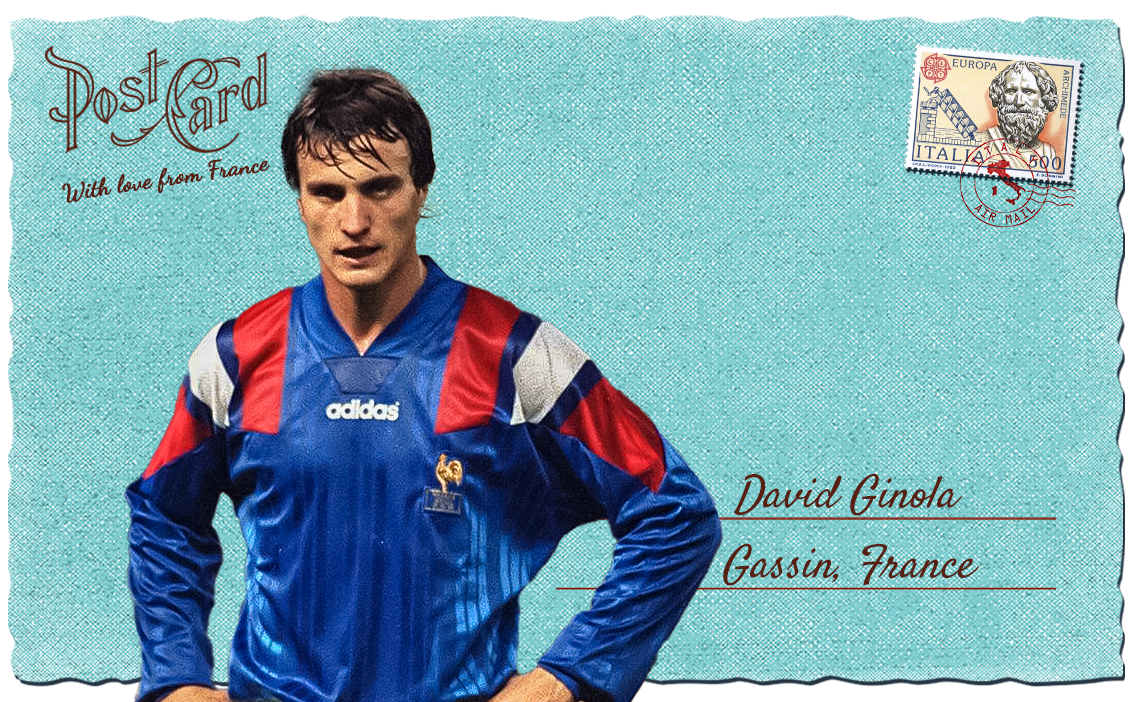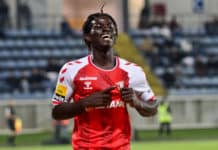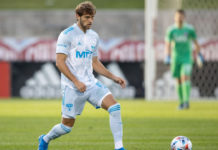Much is talked about the inflow of flashy Europeans to the Premier League in the mid-1990s, and it is a fairly mesmerising list of players – Ruud Gullit, Dennis Bergkamp, Juninho – seen as the pioneers of English football’s new-money revolution. Amid all this one name tends to be forgotten, or at least shunted unfairly into the background. A certain David Ginola.
Born on January 25, 1967, Ginola landed in the same summer as the three above-mentioned men, and of all the period’s spine-tingling European imports he was perhaps, the most thrilling. He was the kind of a technically elegant, two-footed forward who brought excitement to every game that he played in.
🌟 Few foreigners have illuminated the English @premierleague like the electrifying David Ginola. Many happy returns to the winger who won both the PFA and FWA Player of the Year awards in 1998/99 🏆@teamginola | @NUFC | @SpursOfficial pic.twitter.com/CG7LVEvcig
— FIFA.com (@FIFAcom) January 25, 2021
He scored astounding goals, featured for one of the modern era’s legendary sides, and won over peers and pundits alike, claiming a clean sweep of the PFA Players’ and FWA Player of the Year awards in 1999. One of those truly handsome footballers, the dashing winger was part Ryan Giggs, part Ryan Gosling, along with a wholesome splash of Eric Cantona’s French free-spirit.
Arsene Wenger once said “for the English, sport is combat… for the French, it’s a form of expression” and this was truly apt for the artist that Ginola was. His dribbling had such flamboyance that full backs used to invariably lunge forward and being left dead by the artist, who was more of a conjurer than a footballer.
And as all artists, David Ginola, too, faced numerous issues during his career. His first run in with Gerard Houllier in 1993 ultimately cost him a potential World Cup medal in 1998. It isn’t coincidence that Ginola, who played the blameworthy part of during the run in, would be seen as one of those who missed out on a World Cup win with the talent at his possession.
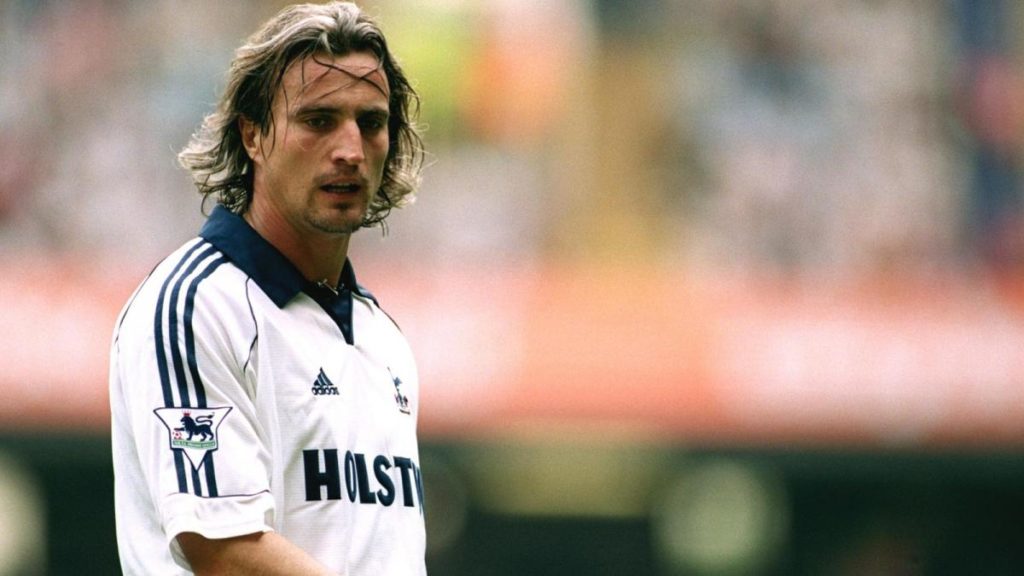 Ginola, while playing for Tottenham. (Image Courtesy: Spurs Nostalgia / Website)
Ginola, while playing for Tottenham. (Image Courtesy: Spurs Nostalgia / Website)
He faced acrimonious situations at Aston Villa and Everton too, from John Gregory and an up-and-coming David Moyes, and one would wonder, what could have happened if he played under a less arduous manager.
Undoubtedly, it was not a surprise that Ginola’s Premier League early flourishing occurred under the expressive manager that Kevin Keegan was and that another proud individualistic player-turned-manager, Johan Cruyff, named him as the world’s best player in 1999.
What comes as more of a surprise though, was Ginola’s joyful years as a player came under the most joyless manager the Premier League would have ever seen in George Graham and for the Tottenham fans who had put up with dull football until the arrival of Graham, Ginola was all that kept the Lilywhite faithful attending match after match just for the sight of the supremely gifted Frenchman.
PLAYING CAREER
EARLY DAYS IN FRANCE
David Ginola started off as a youngster at Sporting Toulon in 1985, who were then in the 1st division. Having played 14 times in his debut season, Ginola went on to become a regular in the side from the following season and was a key part in Toulon’s fifth-place finish in the league in 1988, that included players like Bernard Casoni and Bernard Pardo although they would not qualify for Europe due to a weak UEFA coefficient.
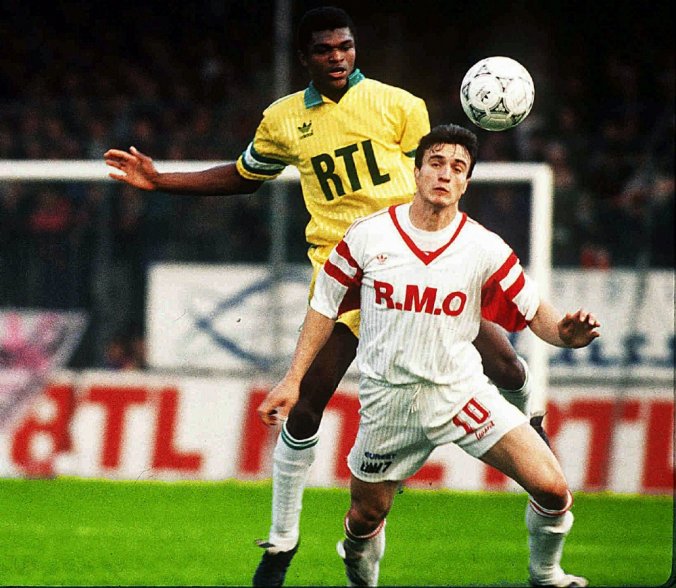
Owing to his performances for Toulon, Ginola, in 1988, moved to RC Paris, that was bought by a new owner and was looking at buying stars in French football. He stayed there for a limited time though, scoring 10 goals in 69 appearances after which he moved to Brest in 1990.
There, he began to win the hearts of many with his flamboyant style of play, scoring 15 goals in 53 appearances for the Brittany-based club, that was marred with pitch invasions, mainly due to their failed administration and a subsequent filing of bankruptcy, which led to the releasing of the first team players.
PARIS SAINT-GERMAIN
After all that had happened at Brest, Ginola moved to powerhouses Paris Saint-Germain on a free transfer in January 1992. And he took no time in settling around and impressing the Parisiens with his elegance and his electrifying pace.
Although his early days were filled with controversies around the national team, he was very popular among the fans. So much so, that even after he admitted that rivals Olympique Marseille were his boyhood club and would have rather joined them than PSG, his popularity did not take a dent.
In his first full season at the club, Ginola won his first trophy as a PSG player, the Coupe de France, and finished the season with 10 goals, including one in the cup final and 5 assists in 48 appearances. The following season, 1993-94, turned out to be the best one in his career, with the team revolving around Ginola.
The team went on to win the league by a huge margin but stumbled at the final stages in Europe, losing in the semi-finals of the Cup Winner’s Cup against Arsenal. Ginola finished the season as the club’s topscorer with 18 goals in 48 appearances, the best turnout of numbers in his whole career.
Ginola’s final season at PSG was marred with injuries, which led to him missing many games. As a consequence, PSG weren’t consistent in the league, finishing third behind Nantes and Lyon. However, Ginola still scored 11 goals in 28 appearances, and played a pivotal role in PSG winning both the domestic cups.
David Ginola scores a worldie for PSG against Real Madrid in 1993 pic.twitter.com/bV6B4wUVKg
— @forgottengoals (@forgottengoals) April 28, 2021
In the summer of 1995, Ginola decided to move from France for further opportunities abroad. It was speculated that the Frenchman would make a move to Spain, with Barcelona seen as the destination, after his dazzling displays against Spanish opposition in European competition. Eventually, though, Ginola ended up signing for Newcastle United, then managed by Kevin Keegan.
NEWCASTLE UNITED
In July 1995, David Ginola moved to Newcastle United for £2.5 million. Now primarily playing as a left-sided winger, Ginola was among Keegan’s first big signings that were made in order to challenge Manchester United for the Premier League title.
With Ginola playing an integral role with five goals and nine assists in 34 appearances, Newcastle finished second, four points behind Manchester United. Although this was Newcastle’s best finish in decades, it was a truly disappointing campaign as they once had a lead 10 points at the halfway stage.
https://www.youtube.com/watch?v=mqGuTCVK4SU
The links with Barcelona, still did not stop, with then manager of the Blaugrana, Bobby Robson personally calling Ginola for a move. But the move never materialised as Newcastle was not interested in seeing the Frenchman leave and nor did Ginola fancy the approach, mostly due to the chemistry that was perfectly formed with his teammates at the Tyneside club. In addition, Newcastle paid a club record £15 million for the transfer of Alan Shearer from Blackburn for the following season.
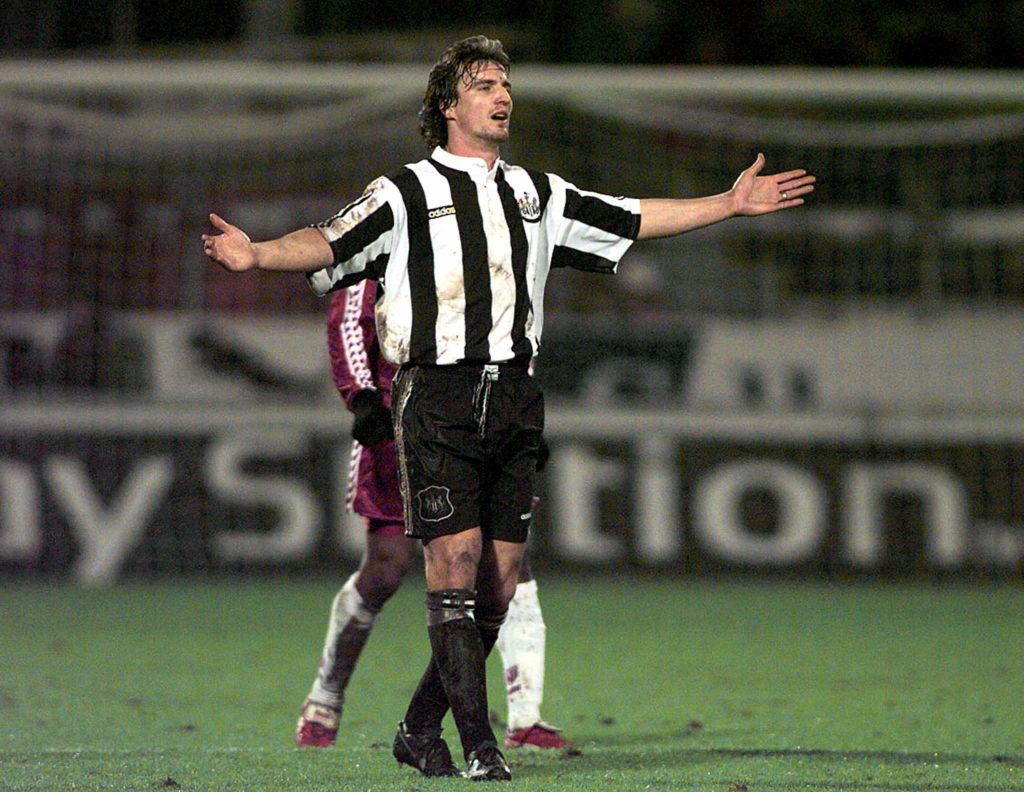 Ginola, while playing for Newcastle. (Image Courtesy: The Football Faithful / Website)
Ginola, while playing for Newcastle. (Image Courtesy: The Football Faithful / Website)
Despite this, Newcastle ended up finishing second, again to Manchester United. Part of the reason can be attributed to Keegan resigning halfway and being replaced by Kenny Dalglish. This had a major effect on Ginola as he was not fancied at all by the Scot and for most of the second half of the season, the Frenchman spent his time warming the bench. In the summer of 1997, Ginola decided to move away from the Magpies, despite his popularity among the Geordies.
TOTTENHAM HOTSPUR
After his fallout with Kenny Dalglish, Ginola moved to Tottenham Hotspur for £2.5 million in 1997, where he made his name around the world with his flamboyant style of play. Even though he scored only 22 goals in the 124 league appearances for Spurs, Ginola’s time at White Hart Lane was known his magical touch of the ball and his ability to weave around players at any point on the pitch.
This was seen when Spurs played Barnsley in the FA Cup sixth Round. Ginola weaved in and out of several Barnsley players and finished in the left side of the net.
Ginola was an integral part of the Tottenham side which won the League Cup in 1999, and this was the only trophy he was able to win with the Lilywhites. That season, he came the first ever player in the history of the Premier League to win the PFA Players’ Player of the Year and the FWA Footballer of the year while at a club who finished outside the top four.
Such were his performances in that season that he is still fondly remembered by Spurs fans for his extravagant forward play and personality off the pitch. This was visible when the Frenchman was given one of the biggest cheers during the club’s 125th anniversary and the club’s legends walked around the pitch.
ASTON VILLA
One season after being named the PFA Players’ Player of the Year, Ginola was deemed surplus by the Spurs board and was sold to Aston Villa in July 2000 for a reported £3 million. Ginola even said that the news of an offer being accepted came as a bombshell, but he eventually came to terms with the decision. The 18 months at Villa Park were difficult for the Frenchman as he had frequent run ins with the manager, John Gregory.
#OTD in 2000: We said bonjour to French legend @TeamGinola, who joined us from Tottenham Hotspur 📅#PL #AVFC pic.twitter.com/4pOOXEWMls
— Aston Villa (@AVFCOfficial) July 29, 2019
The most notable moment came when Gregory accused him of being overweight, and Ginola, is his way, scored a blockbuster goal against Manchester City and removed his shirt, showing a toned physique, proving the manager wrong.
EVERTON
In January 2002, Ginola moved to Everton on a free transfer, but only played five league games for the club before being deemed surplus to requirements by manager David Moyes, who had just arrived at the club in March. Subsequently, Ginola retired from football at the end of the season, aged 35.
Happy 51st birthday to former #EFC winger David Ginola.
🎂
Past his best when he came to Everton, but he had beautiful hair. pic.twitter.com/obz0agmFHG
— Everton FC News (@LivEchoEFC) January 25, 2018
INTERNATIONAL CAREER
Even though David Ginola was a reputed French player, he was only capped 17 times for the national team. Before debuting for the senior team, Ginola played for the France U-21 side at the Toulon Tournament and was adjudged the best player of the tournament after beating England 4-3 in 1987.
But the significant moment of Ginola’s international career occurred at in 1993, when the winger was heralded infamously for his mistake in the qualifiers for the 1994 FIFA World Cup. France were playing against Bulgaria in their last group stage game, where a draw would suffice for their qualification for the World Cup.
In the last minute of the match, when the score was tied at 1-1, Ginola overhit a cross intended for Eric Cantona, and Bulgaria scored from a quick counterattack and qualified for the World Cup at the expense of France.
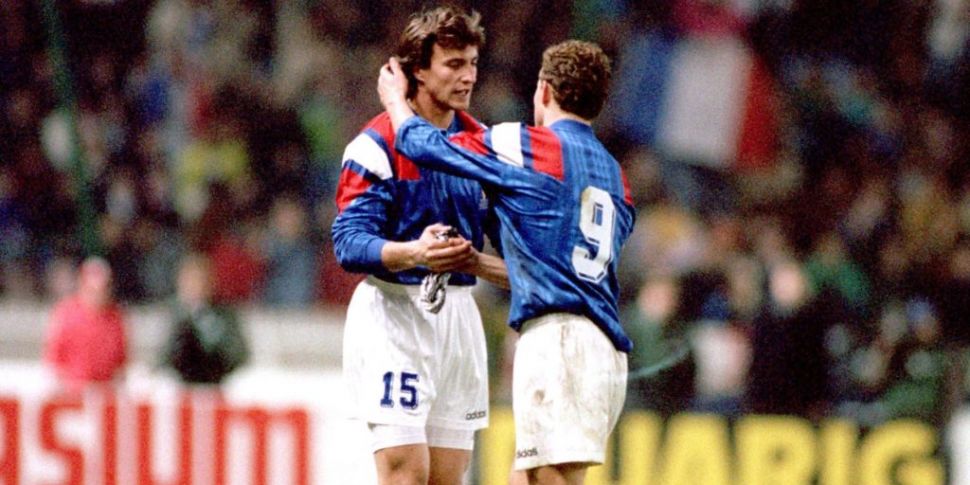 Ginola at the qualifiers for the 1994 FIFA World Cup . (Image Courtesy: FIFA / Website)
Ginola at the qualifiers for the 1994 FIFA World Cup . (Image Courtesy: FIFA / Website)
After the incident, then France’s manager Gerard Houllier entirely blamed Ginola for France’s inability to qualify and branded him as someone who had “sent an Exocet missile through the heart of French football” and as the “assassin of the team”.
These comments had haunted Ginola for the coming years in his career and further inquisitions by the media, Ginola decided to leave France and subsequently moved to England. Although Aimé Jacquet, Houlliers’s successor selected Ginola regularly, he was sporadically used.
Ultimately, Ginola played his last international game in 1995, ending up with three goals and six assists in 17 appearances.
INDIVIDUAL ACCOLADES
David Ginola, in his career won quite a few accolades for himself. Early in his career, while playing for the France U21 squad, Ginola won the award for the Best Player of the Tournament at the Toulon Tournament, a prestigious competition held for national teams composed of youth players from U-17 to U-23 level.
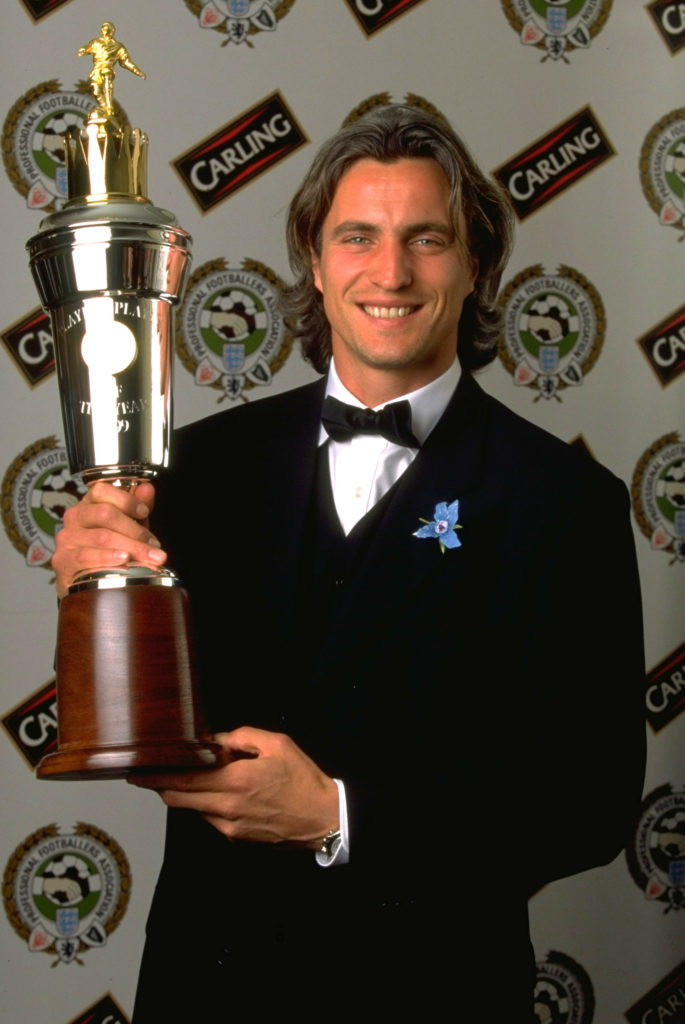 Ginola after winning the PFA Players’ Player of the Year in 1999. (Image Courtesy: Hotspur HQ / Website)
Ginola after winning the PFA Players’ Player of the Year in 1999. (Image Courtesy: Hotspur HQ / Website)
In the later years, Ginola went on to win the French Player of the Year in 1993, French Division 1 Player of the Year in 1993-94, during his days at PSG. For his dazzling displays in the Premier League for Tottenham, Ginola was adjudged the PFA Player’s Player of the Year and also the FWA Footballer of the Year for the 1998-99 season.
LIFE AFTER FOOTBALL
After his retirement, David Ginola made his name in acting and modelling. He took his first steps into acting by taking classes at the Royal Academy of Dramatic Art in England. Subsequently, Ginola went on to make his debut in the movie as Didier The Butcher, the protagonist in the Anglo-French movie, Rosbeef. Further he made appearences in various other TV series such as At Home with the Braithwaites, The Centre, City Lights and The Young and the Restless.
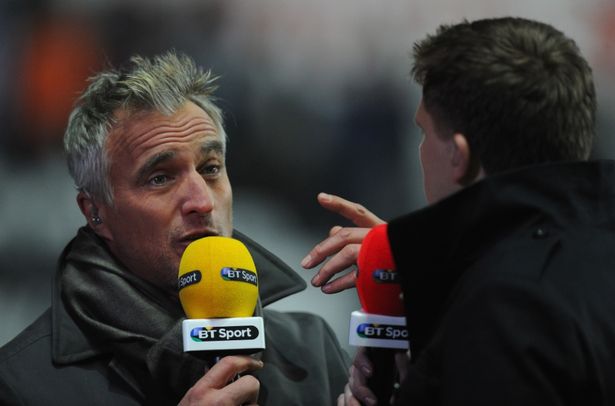 David Ginola working as a pundit. (Image Courtesy: Mirror / Website)
David Ginola working as a pundit. (Image Courtesy: Mirror / Website)
Ginola, also, returned to football as a pundit with the BBC, Sky Sports, CANAL+, CNN and BT Sport. In 2015, he put in a failed bid for the FIFA Presidency in his campaign against Sepp Blatter, denouncing him for his corrupt activities and credibility.
Back in 2008, he made his way into winery too, bagging the second place at the International Wine Challenge for a rosé wine produced at his vineyard in Provence.

